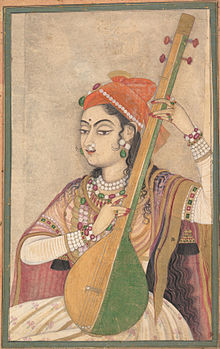Vande Mataram
| English: Vande Mataram | |
|---|---|
| Bônde Matorom (Bengali pronunciation); Vande Mataram (Sanskrit or Hindi pronunciation) | |
| Lyrics | Bankim Chandra Chattopadhyay, Anandamath (1882) |
| Music | Jadunath Bhattacharya |
| Adopted | 24 January 1950 |
| Music of India | |
|---|---|

A Lady Playing the Tanpura, ca. 1735 (Rajasthan)
|
|
| Genres | |
|
|
| Media and performance | |
| Music awards | |
| Music festivals | |
| Music media | |
| Nationalistic and patriotic songs | |
| National anthem | Jana Gana Mana |
| Regional music | |
|
|
Vande Mataram (Bengali script: বন্দে মাতরম্, Devanagari: वन्दे मातरम्, Vande Mātaram) is a poem from Bankim Chandra Chattopadhyay's 1882 novel Anandamath. Though 'Vande Mataram' literally means "I praise thee, Mother" the English translation by Sri Aurobindo was rendered as "I bow to thee, Mother". An Ode to Mother Bengal as Mother goddess, it was written in Bengali and Sanskrit.
It played a vital role in the Indian independence movement, first sung in a political context by Rabindranath Tagore at the 1896 session of the Indian National Congress. Spiritual Indian nationalist and philosopher Sri Aurobindo referred it as "National Anthem of Bengal".
In 1950 (after India's independence), the song's first two verses were given the official status of the "national song" of the Republic of India, distinct from the national anthem of India, Jana Gana Mana.
The two verses of Vande Mataram adopted as the "National song" read as follows:
বন্দে মাতরম্৷
সুজলাং সুফলাং
মলয়জশীতলাম্
শস্যশ্যামলাং
মাতরম্!
বন্দে মাতরম্৷.
শুভ্র-জ্যোৎস্না
পুলকিত-যামিনীম্
ফুল্লকুসুমিত
দ্রুমদলশোভিনীম্,
সুহাসিনীং
সুমধুরভাষিণীম্
সুখদাং বরদাং
মাতরম্৷৷
বন্দে মাতরম্৷
...
Wikipedia
